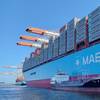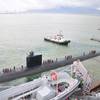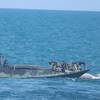Maritime Coalition Leaders Discuss Security Issues
From Combined Maritime Forces Public Affairs
Senior naval commanders, hailing from Bahrain, France, the United Kingdom, and the United States, met at the Combined Maritime Forces (CMF) headquarters in Bahrain April 1 to review operations and exercises, as well as future opportunities to build the coalition.
Hosted by CMF Commander, Vice Adm. Kevin J. Cosgriff, and Deputy Commander, Royal Navy Commodore Keith Winstanley, the one-day conference included discussion of efforts to build a lawful maritime order and provide a safe environment for legitimate mariners to keep the flow of commerce in international waters open.
"Coalition efforts build a lawful maritime order for regional security," said Winstanley. "When we work as a Coalition with regional partners, we are able to complement regional countries efforts and really make a difference."
Opening the conference, Winstanley recognized three new liaison officers joining the coalition staff. These international representatives to the CMF staff provide significant insight into the conduct of Maritime Security Operations (MSO) throughout the region.
The coalition's mission is to deny and disrupt the use of the maritime environment for terrorism or facilitation of terror. Coalition members have a common purpose and goal – to increase the security and prosperity of the region by working together for a better future. Coalition forces work to promote the maritime environment as a safe place for mariners with legitimate business.
Since the last conference, all three Task Forces have changed command. now leads Task Force 150 operations in the Arabian Sea and Gulf of Aden; commands Task Force 152 in the Central and Southern Persian Gulf, the first Gulf country to do so; and the oversees Task Force 158 in the .
Winstanley also noted significant successful efforts in counter-drug smuggling operations and an increased focus on coordinating with regional countries.
The most recent interception of contraband occurred March 12 in the by Canadian multipurpose frigate HMCS Charlottetown (FFH 339), who stopped illegal smuggling activities while conducting MSO.
boarded a dhow and discovered approximately 1.7 tons of hashish worth several million dollars. The drugs were disposed of at sea and the vessel was held until local authorities arrived.
During the conference, Cosgriff highlighted the productive operations task forces are doing daily within the region.
"The change we've seen in the last year is a function of the coalition," he said. "This is a true coalition - navies coming together voluntarily to contribute to maritime security missions, to deny and disrupt the use of the seas by terrorists - or facilitators of terrorism. We've banded together and it's important we conduct operations as a group. We're building on the baseline of our predecessors and we're making a difference."
Cosgriff also reviewed the mission and effect each Task Force is having in the region. All three commanders also provided updates during the conference.
"Our coalition has an important role in sharing knowledge and experience which encourages other nations, both regional and international, to join our effort," said Cosgriff. "Task Force 150 focuses on learning; this area is the biggest operating area within coalition waters. Task Force 152 operations center on building where commanders develop a picture inside the of what it means to deny and disrupt terrorism. Task Force 158 spotlights sustaining infrastructure protection and training the Iraqi Navy."
MSO complements the counter-terrorism and security efforts of regional nations and seek to disrupt violent extremists' use of the maritime environment as a venue for attack or to transport personnel, weapons or other material.












